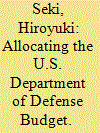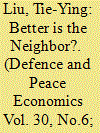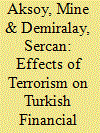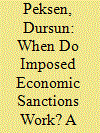|
|
|
Sort Order |
|
|
|
Items / Page
|
|
|
|
|
|
|
| Srl | Item |
| 1 |
ID:
168861


|
|
|
|
|
| Summary/Abstract |
This article examines the ‘incremental/fair share model’ that was proposed by Alex Mintz in 1988 concerning the budget allocation of the U.S. Department of Defense. Although Mintz was unable to confirm the correctness of his model, this study demonstrated it to be statistically significant. In the statistical analyses, I used the two-stage least squares method and Durbin’s h-test to better scrutinize the model’s adequacy. Few previous studies have addressed the allocation of the U.S. defence budget; consequently, the incremental/fair-share model should constitute a starting point for further research on the U.S. defence budget allocation.
|
|
|
|
|
|
|
|
|
|
|
|
|
|
|
|
| 2 |
ID:
168860


|
|
|
|
|
| Summary/Abstract |
This study applies the Sequential Panel Selection Method (SPSM), to investigate the convergence properties of the military expenditure of the North Atlantic Treaty Organization (NATO) during the period of 1990–2015. Compared to the traditional methods, SPSM considers fundamentally general spatial homogeneous and heterogeneous relationships with countries and examines the evolution of military expenditure. We find that four-fifths of NATO member countries have been convergent with the UK, but no country’s military expenditure is convergent with the US. This means that there is no significant linkage effect in the US for NATO military expenditure. While they are allies of the US, the majority of NATO member countries’ military expenditures are consistent with UK military expenditure. The main reasons are due to the geographical space layout and the international relationship convergence. The results indicate that more than four-fifths of NATO member countries have been coordinated with convergence theory and spillover effect.
|
|
|
|
|
|
|
|
|
|
|
|
|
|
|
|
| 3 |
ID:
168862


|
|
|
|
|
| Summary/Abstract |
In this research, we analyzed how Turkish financial markets and foreign investors in the stock market reacted to the terror attacks in Turkey. Our analysis, which was performed using the terror index for the stock market and the foreign exchange market, revealed that returns, abnormal returns, and cumulative abnormal returns were not affected by the terror attacks; however, foreign investors in the stock market were affected. When the geographic regions of the terror attacks were analyzed, the findings showed that foreign investors were negatively affected mainly by the terror attacks that occurred in southeast Anatolia. Attack type and target type were important only for foreign investors. An evaluation of the interaction between the terror attacks and the markets with the involvement of the terrorist organizations indicated that only the foreign investors in the stock market were affected by Al-Qaeda and PKK-linked terror attacks. An evaluation of the effect of terror attacks in foreign countries on Turkish financial markets revealed no effect on the domestic stock market and foreign exchange markets. We also examined the volatility spillovers from the terror index to the stock market and found that terrorist attacks increased the volatility of the stock market.
|
|
|
|
|
|
|
|
|
|
|
|
|
|
|
|
| 4 |
ID:
168858


|
|
|
|
|
| Summary/Abstract |
The current field study used unique data collected in Israel in July 2014, during a military operation that the Israel Defence Forces (I.D.F.) conducted in the Gaza Strip, in reaction to the thousands of missiles launched from there into Israel. During this operation, the new Iron Dome anti-missile defence system was used to protect Israelis exposed to missile attacks. The study examined factors that correlate with decisions to comply with I.D.F. defence instructions regarding behaviour during missile attacks. In addition, the study examined the relationship between attitudes towards the Iron Dome technology and emotions, risk perceptions, and the decision to comply with I.D.F. defence instructions. The results indicate that stronger positive opinions towards Iron Dome were correlated with lower levels of fear and anger, and beliefs that participant’s chances of being injured by a missile were lower than they had been during previous military operation. In addition, better compliance with I.D.F. defence instructions correlated with being more fearful, angrier at Hamas, living closer to Gaza Strip, and having more positive opinions about Iron Dome. The findings also indicate gender differences with respect to factors correlated with risk perceptions, opinions regarding Iron Dome, and precautionary actions during attacks.
|
|
|
|
|
|
|
|
|
|
|
|
|
|
|
|
| 5 |
ID:
168859


|
|
|
|
|
| Summary/Abstract |
This paper addresses the waves of mass killings recently perpetrated by individuals with a weak or nonexistent ideological motivation, whose acts either appear to contradict their purported political cause or are admittedly driven by a quest for notoriety. Examples range from killers who have been waging jihad against European Jews to unattached mass killers such as the Germanwings pilot to the perpetrators of mass school shootings in America and worldwide. We argue that these phenomena can be understood as instances of the Herostratos syndrome, which has been known for thousands of years as characterizing the behavior of people who seek to survive in the collective memory by excelling in their infamous acts. We provide a model of hybrid killers which accommodates the Herostratic motive alongside a political motive and characterize a well-behaved Nash equilibrium where Herostratic killers are competing with one another with a view to make a name for themselves in infamy. The policy implications point towards reducing the publicity the killers enjoy, thus frustrating their quest for notoriety.
|
|
|
|
|
|
|
|
|
|
|
|
|
|
|
|
| 6 |
ID:
168857


|
|
|
|
|
| Summary/Abstract |
This work examines how U.S. economic sanctions affect social welfare spending in authoritarian countries. U.S. economic sanctions play a role of leading autocratic targets to change social policy through two theoretical channels. First, U.S. economic sanctions may reduce autocrats’ resources to buy off supports from ruling elite groups and so force autocrats to reallocate government expenditure in favor of their supporting groups. Consequently, autocrats facing longer U.S. sanctions are likely to cut spending on public goods and services, especially on education and health care spending. Second, the impacts of U.S. sanction duration on social spending vary according to political variables such as autocrats’ pseudo-democratic institutions. The empirical findings show that, even when U.S. sanctions last a long time, autocrats under nominal democratic institutions cut spending on education and health to a lesser degree than do autocrats with no such institutions. In contrast, autocrats relying on pseudo-democratic institutions reduce social security spending a little more than did non-institutionalized autocrats.
|
|
|
|
|
|
|
|
|
|
|
|
|
|
|
|
| 7 |
ID:
168856


|
|
|
|
|
| Summary/Abstract |
There is growing policy consensus in Washington and other Western capitals that economic sanctions are powerful tools to cope with major foreign policy crises. Are sanctions, particularly targeted sanctions, really the potent instruments optimists suggest? Under what circumstances do punitive economic measures induce policy change in sanctioned countries? To probe these queries, in this article I outline the conditions that have been identified as more likely to lead to successful sanctions outcomes in the literature. I also discuss four major shortcomings of existing scholarship. First, the sender-biased interpretation of sanctions effectiveness renders the treatment of the ‘ineffective’ cases with negative outcomes the same as those cases that induce no discernable change in target behavior. Second, the prevalent use of static data from existing sanctions databases reduces the ability of researchers to study various time-specific factors affecting the probability of sanctions success. Third, the dominant state-centric bargaining model in the literature offers limited insight into contemporary coercive measures directed at non-state actors. Fourth, the study of sanctions in isolation of other instruments that frequently accompany them, such as incentives and diplomatic pressure, leads to a partial understanding of the specific role sanctions play in shaping the outcome of key foreign policy initiatives.
|
|
|
|
|
|
|
|
|
|
|
|
|
|
|
|
|
|
|
|
|